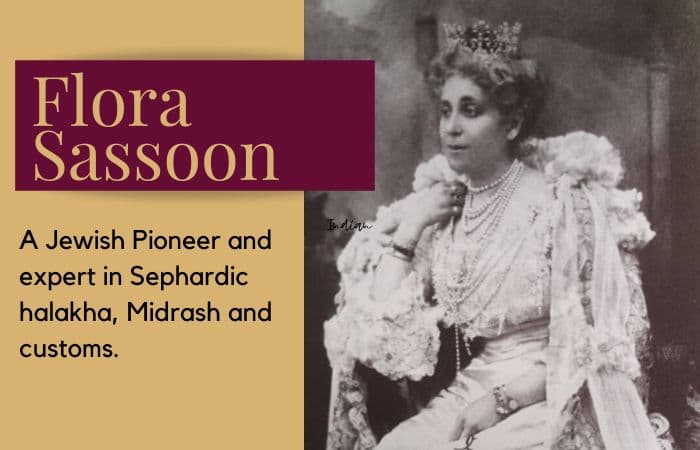Aziza and Yehezkel Abraham Gabay gave birth to Madam Frecha-Flora Sassoon in Bombay (now Mumbai), India, in 1859. The Sassoon family came to India from Iraq as traders and businesspeople. Being extremely wealthy, the Sassoons were occasionally referred to be the Rothschilds of the East. Madam Frecha-Flora Sassoon received her education from private tutors, the rabbis of the Baghdadi community, and a Catholic school. She had mastered seven languages and Jewish literature by the time she was 17 years old.
She wed Mr. Sliman Sasson, who oversaw several of the Sassoon family businesses, in 1876. There were three kids born to the couple: David Sliman, Rachel, and Mazal-Tov.
After her husband passed away in 1894, she took over running the entire family business. She gave financial support to Mordecai Zeev Havkin, who created vaccinations against plague and cholera and helped save many lives, during the 1896 plague pandemic in India. She also participated actively in the anti-purdah movement, which opposed the attempt to forcefully conceal all of a woman’s body, including her face and, in some circumstances, her eyes. She relocated to London in 1901 in an effort to get her daughter Mazal-Tov medical attention. Every time she traveled, ten men would accompany her so that she could pray with a minyan and a shochet would accompany her to make sure she had kosher food.
She traveled to Baghdad in 1910 with David Sliman and Rachel, two of her children. During her visit, she had official discussions with the Walli of Baghdad, the Chief Rabbi of Baghdad, Hacham Ezra Danghoor, and the son of the Ben Ish Hai, Hacham Yosef Haim. One of the Sassoon family heads had donated a Torah scroll, which she used to read the Torah at the synagogue during her visit.
Madam Frecha-Flora Sassoon supported the creation of a Jewish state after the Balfour Declaration. Additionally, she sponsored and offered guarantees to Jewish refugees trying to get to England. In 1925, she traveled to Jerusalem with her son David Sliman.
Madam Frecha-Flora Sassoon found and gathered manuscripts written by Jews from the Orient with the assistance of her daughter Rachel, who stayed in India. The Sassoon collection is currently one of the most significant sources for the study of manuscripts related to Jewish Studies. Expert in Sephardi traditions and halakhic practice, Midrash, and Oriental Jewish writings, Madam Frecha-Flora Sassoon corresponded with Hacham Yosef Haim, also known as the Ben Ish Hai, on halakhic matters and other subjects.
The Mount of Olives cemetery is where Madam Frecha-Flora Sassoon was laid to rest after passing away on 9 Tevet, 5696 (1936).








Ohr HaChaim Yomi – Emor